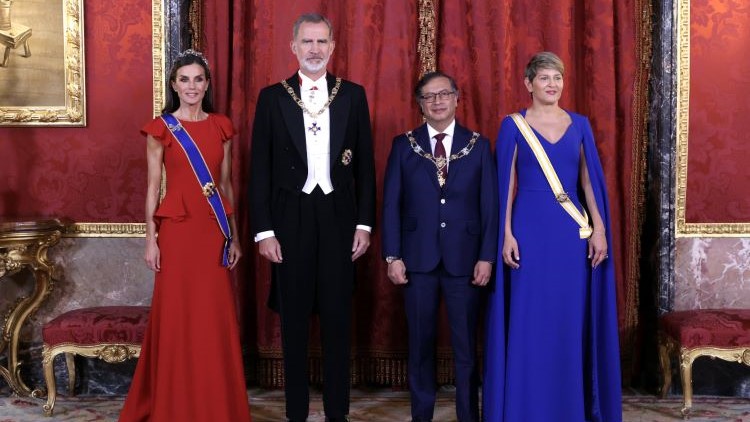Eduardo González
Yesterday, King Felipe VI took advantage of the honorary dinner offered to the President of Colombia, Gustavo Petro, on the occasion of his first state visit to Spain, to announce that Queen Letizia will travel “soon” to his country to get to know on the ground the projects of the Spanish Cooperation. Previously, the Colombian president defended “a new brotherhood that does not remember the past” during his speech in Congress, which was boycotted by the deputies of the ultra-right-wing group Vox.
The day began at the Royal Palace in Madrid, where Petro and his wife, Verónica Alcocer, were received by the King and Queen of Spain, in the presence of the President of the Government, Pedro Sánchez. Afterwards, the Colombian leader held a meeting with Felipe VI at the Zarzuela Palace, in the presence of the Minister of Foreign Affairs, José Manuel Albares; the Spanish Ambassador to Colombia, Joaquín María Arístegui; the Colombian Minister of Foreign Affairs, Álvaro Leyva; and the Colombian Ambassador to Spain, Eduardo Ávila. Afterwards, Don Felipe and Doña Letizia offered a private lunch to President Gustavo Petro and the First Lady at La Zarzuela Palace.
Subsequently, Petro spoke in the Congress of Deputies before a joint session of the two Chambers of the Spanish Parliament, where he was received standing and with applause by all the parliamentary groups except the ultra-right-wing deputies of Vox, who left the room just as the Colombian president began his speech. The event was attended by several members of the Government, including the Minister of Foreign Affairs, José Manuel Albares; the Second Vice-President and Minister of Labor and Social Economy, Yolanda Díaz, and the Ministers of Finance, Interior, Presidency, Culture and Sport, Social Rights and Agenda 2030, Science and Innovation, Equality, Consumption, Inclusion and Universities.
In his speech before the MPs (which was preceded by the imposition of the Congress and Senate medals from the hands of the presidents of both chambers, Meritxell Batet and Ander Gil), Petro urged Spain, on behalf of the ties between the two countries and in view of the upcoming Spanish Presidency of the EU, to “lay a different basis for a different relationship.”
“You are going to lead Europe and we are going to meet you at the CELAC-European Union,” Petro reminded. These events, he warned, can serve “to keep things as they are” or “to lay different foundations”, but “the world demands, at least from our side, different foundations” because “we are in the times of the climate crisis” and, therefore, “the politicians of the world” have “the historic responsibility” to lead “a profound political change” to face “the climate crisis and the population exodus”.
“Our reality today is apocalyptic” and “science is telling us that we are beginning the times of extinction, a moment of deep crisis, of paradigm shift,” he said. To this end, Gustavo Petro invited Spain, a “world power of life, leading Europe”, to work with Colombia to build a better planet through “a new brotherhood that does not remember the past, but a new existence”.
Afterwards, Gustavo Petro went to Madrid City Hall, where he received the Golden Key of the City of Madrid from the Mayor, José Luis Martínez Almeida, and declared that “Spain has a lot to say in a meeting between Europe and Latin America, it can say new things, it can propose an influence to humanity, as Madrid did not decades ago, an influence that has to do with the need to change”.
Speeches at the honorary dinner
The Colombian president’s first day concluded with the dinner offered by the King and Queen to Petro and his wife at the Royal Palace in Madrid, which was attended by the First Vice President and Minister of Economic Affairs and Digital Transformation, Nadia Calviño; the Minister of Industry, Trade and Tourism, Héctor Gómez, and the Minister of Foreign Affairs, José Manuel Albares.
In his speech, the King affirmed that between the two countries reigns “a relationship of brotherhood, mutual respect and enormous strategic interest” and warned that, “in a convulsive time in which we face serious threats to international peace and security”, the “strategic alliance with Colombia is especially important and it is now when we must raise to that strategic dimension all the content it deserves”.
“Colombia and Spain must defend more strongly than ever the full validity of democracy, the rule of law, human rights and the principles of the UN Charter,” he warned. “I encourage you to continue along the path of harmony and brotherhood between our peoples, and I propose that we toast to the present and future of Spain and Colombia, to the deep ties between our nations, which your visit will surely strengthen,” he added.
Felipe VI also highlighted “the dynamism of our economic and business exchanges” and the presence of “more than 800 Spanish companies, whether small, medium or large, operating in Colombia” and which “are characterized by their commitment to the development and prosperity of Colombian society and have always demonstrated this in any circumstance”.
He also praised “the social conscience and commitment shown” by Petro “since he assumed the presidency and which has characterized his political and personal career”. “That is why Spain has for decades prioritized its Development Cooperation policies and efforts, and bilateral and multilateral financial support to help in the areas of greatest need,” he said. “Queen Letizia, in her constant dedication and support to Spanish Cooperation, will soon travel to Colombia to meet and support in situ some of our programs, and will bear witness to the great vocation of solidarity of the Spanish, which Colombia knows well,” he announced.
“Peace building has always been one of the pillars of the relationship between our countries, which today is more valid than ever,” he continued. “The priority that your government gives to the policy of total peace, together with the commitment of our country to support this effort, make this a particularly important moment to advance in the yearning shared by all Colombians: the silence of arms, and, in this sense, you can count on Spain throughout the arduous, but so necessary, path that you have bravely decided to undertake in search of a lasting peace in your country,” he stated.
For his part, Petro insisted on the same apocalyptic vision shown hours earlier in Congress. “We are on the verge of extinction,” he reiterated. “The process of deepening climate catastrophe or political tensions will be of such magnitude, of such depth that even our own history, of world wars or totalitarianisms, are going to be in diapers for what may happen,” he warned.
For this reason, he proposed a “new paradigm” of relations between Europe and America in which there is no winner and no loser, and made a reference to the strategy of his government to advance in the energy transition as the basis for a new economy in the face of the climate crisis. In this regard, he said that Latin America is the region that has the best opportunities to generate clean energy, because it has “water, wind and sun”, which “are the basis of the new economy” because “without them there is no clean energy, without them we will become extinct”. Petro concluded his speech with a toast to life.
Petro attended the dinner with the Necklace of the Order of Isabella the Catholic, but dressed in a suit and tie and not in tails, as is the etiquette for this type of gala dinner, because the Colombian leader considers that it is a garment that “has to do with elites, with anti-democracy”. Just a day before his trip to Spain, the president used his Workers’ Day speech to pay tribute to “those who created this Republic, willing to get themselves killed so that this country would be free” from the “Spanish yoke of the Crown”.







